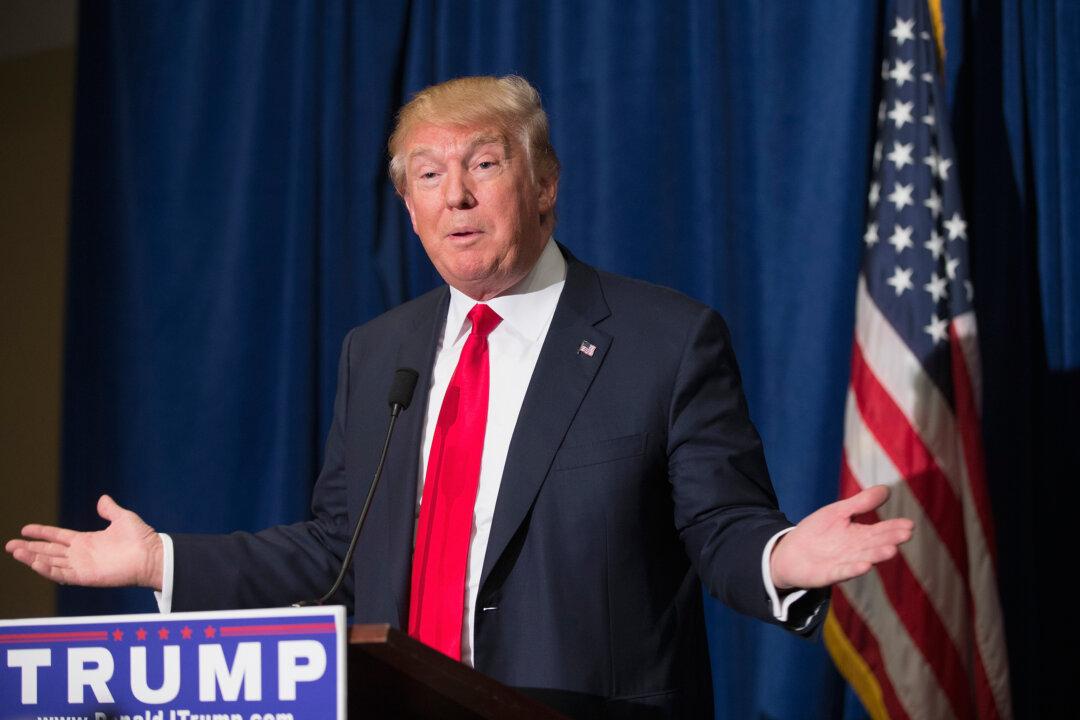WASHINGTON—What’s a Donald Trump campaign for president look like if he’s no longer the only front-runner for the Republican nomination? We’re about to find out, just as soon as he decides.
“Well, I don’t get it,” a confounded Trump said this week when asked to explain why the preference polls he touts every time he’s campaigning no longer show him as the unquestioned leader of the GOP’s 2016 presidential field.
Preference polls are a far-from-perfect way to predict election outcomes, especially with voters still three months away from casting ballots in the first-to-vote Iowa caucuses. But with Trump, they are the centerpiece of his campaign.
So far, the real estate mogul and reality TV star has forgone paid advertising and traditional small-scale campaign events, where candidates interact with voters in the early voting states, for massive rallies in arenas and auditoriums. At nearly every one, Trump begins his speech by recounting his place in the latest polls, reciting one number after the next with the help of hand-written notes.
Until recently, Trump held a lead nationally and in the early primary states in preference polls. But recent surveys have shown retired neurosurgeon Ben Carson nabbing an advantage over Trump in Iowa. A poll released this week by CBS News and The New York Times also showed Carson catching up to Trump nationally, too.
“This process is extremely fluid right now,” said Patrick Murray, director of the Monmouth University Polling Institute, which conducted one of the Iowa polls. “Those outsider voters are now flipping back and forth.”
For Trump, the development appears to be a hard-to-swallow reversal — one that some supporters hope will force the billionaire businessman to compete harder for the Republican nomination than he has since the summer launch of his campaign.
Initially, however, Trump’s response was to lash out at pollsters, as well as the media outlets that sponsor the polls and report their results.
In referring to a poll taken in Iowa, Trump called The Des Moines Register a third-rate newspaper and described Bloomberg News as a company against him because its founder and namesake, Michael Bloomberg, has indicated a desire to run for president in the past.
“Right now it’s not very scientific,” he said Tuesday of the polls. Hours later, he took to Twitter to tout other surveys that still show him in the lead.
Trump has also become increasingly negative.
During rallies in Florida over the weekend and in New Hampshire on Monday, Trump referred to reporters as scum and liars who were out to get his campaign.
And he’s moved on from repeatedly needling former Florida Gov. Jeb Bush to poking at Carson. Appearing baffled by Carson’s rise, he’s told audiences that he just doesn’t understand the soft-spoken conservative’s appeal.
He also raised questions about Carson’s religious faith and has started to highlight what he says are contradictions in his record and policy positions.
But a new Trump emerged Tuesday night, at a rally in Sioux City, Iowa, that marked his first return to the state since his poll numbers dipped. Lamenting how much he hated being in second place, Trump practically begged voters to back him.
“Iowa, will you get your numbers up, please?” he urged the crowd. “I promise you, I will do such a good job.”
Expressing dismay at his apparent drop in support among evangelical Christians, Trump repeatedly touted his faith, telling evangelicals in the audience: “I am the real deal.”





